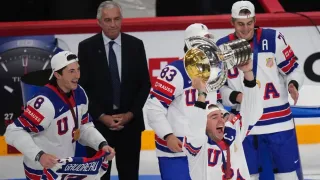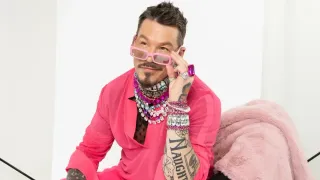September 29, 2020
Milan Fashion Gives Small Opening to Black Lives Matter
Colleen Barry READ TIME: 4 MIN.
When asked why there aren't more people of color in the Italian fashion industry, officials have cited a lack of candidates in homogeneous Italy. Five African-born designers in Italy want to put that view to rest with their inclusion on the official Milan Fashion Week calendar Sunday.
Fabiola Manirakiza came to Italy after her parents were killed in her native Burundi in 1972. For her Made-in-Italy Kiza label, she incorporates patterns from her Bantu tribe, as taught by an elder sister, into her Western tailored silhouette, the influence of the Italian family who raised her.
''It is not just Italy that needs to see, it is the whole world,'' said Manikrazia, whose creations were among those featured in the video presentation titled "We Are Made in Italy. Italy is Made of Us."
The official Black Lives Matter in Italian fashion event is a first step in a process that Stella Jean, the only Black designer belonging to Italy's prestigious fashion council, hopes will bring real diversity to the creative and decision-making centers of Italian fashion to combat racism in the industry.
Another critical step was the launch of a think tank last week bringing together top fashion houses on the council with Black creatives. But Jean said there remains resistance to the campaign she has launched with U.S. designer Edward Buchanan and Michelle Ngomo, founder of Afro Fashion Week Milano, with pressure on them to abandon it.
Italy's relatively small African-origin population, which government statistics put at around 1.2 million, has rendered it mostly invisible in the country of some 60 million, with no well-known faces in the political class or on television – and few behind the closed doors of Italian fashion.
Jean and her colleagues began pushing the industry to make concrete moves toward diversifying Italian fashion after major houses showed social media support for the Black Lives Matter protests over racial equality and police brutality during the summer. After many racially charged gaffes in recent years, they also are asking for an accounting of the numbers of people of color working inside the system.
"No one is looking to stand back and blame you for the current situation,'' Jean said in introductory remarks to the think tank, made available to The Associated Press. ''Instead we are asking you to be part of the solution starting today. Racism in Italy ... is a very unique case study. It doesn't resemble the type that exists with our European neighbors and it also differs greatly from the American kind. This however doesn't render it less harmful or discriminative, only different.''
Jean told The Associated Press that the few companies whose representatives spoke discussed activities to support Black minorities in the United States and other causes ''but completely avoiding the point of our discussion: Black minority in Italy.''
"I must say with all sincerity that the silence of the representatives of the colossal Made-in-Italy brands left a lasting bitter and embarrassing impression,'' Jean said. ''In total astonishment, it struck me that greatness and global commercial authority does not always correspond to an equally grand sense of responsibility to humanity.''
On a positive note, the fashion council had agreed to implement six reform points by February, she said. The council also agreed to provide scholarships and mentorships to fashion students of color. And she hopes that the time spent listening will lead to greater participation next time.
The head of Italy's fashion council, Carlo Capasa, called the meeting ''interesting and instructive,'' and that the brand representatives were there to mostly listen. ''There was no reason for friction,'' he said.
Calling the meeting, ''a beginning,'' he told the AP the council will continue to work on diversity points of its nearly year-old diversity manifesto, including the commitment that diversity is an asset. He confirmed that the think tank would continue to meet periodically.
The brands participating were Armani, Zegna, Bottega Veneta, Etro, Gucci, Prada, Valentino and Ferragamo. The Kering conglomerate, which owns Gucci and Bottega Veneta, and the OTB group, which owns Marni and Diesel also participated.
A planned closing statement was never issued.
But Miuccia Prada, during the video presentation of next spring's collection, emphasized the importance of inclusivity, along with sustainability. She acknowledged the need to ''really embrace it," adding ''which is what I decided to do, not only declaring it, but trying, little by little, to be better.''
The participants in the Black Lives Matter event have worked in other trades or professions before following their fashion dreams. Most have submitted resumes to fashion companies, with no response, and some have seen professional doors fail to open after promising meetings, without explanation.
Joy Meribe, born in Nigeria and with an Italian Masters in business, studied fashion in Italy so she could alter garments she was selling through her blog on African fashion designers, and realized she had the knack herself. Her collection, Modaf Designs, uses African prints on silk and cotton instead of the traditional wax cloth, making them easier to wear and integrate into a Western wardrobe.
Claudia Gisele Ntsama, originally from Cameroon, has supported herself cleaning houses to pursue her dream of becoming a fashion designer, unveiling in Milan fantastical swirling pieces made mostly of raw hemp.
Ngomo, who discovered the five designers, said she feels a great responsibility also to young people of color in Italy who have been inspired by the initiatives.
''Many kids are writing to thank me, saying they have rediscovered their trust, and they had hope,'' Ngomo said. "I know we are trendy now. I am not sure next year we will have all this light on the project. I want to be positive and believe this is a next step.''






